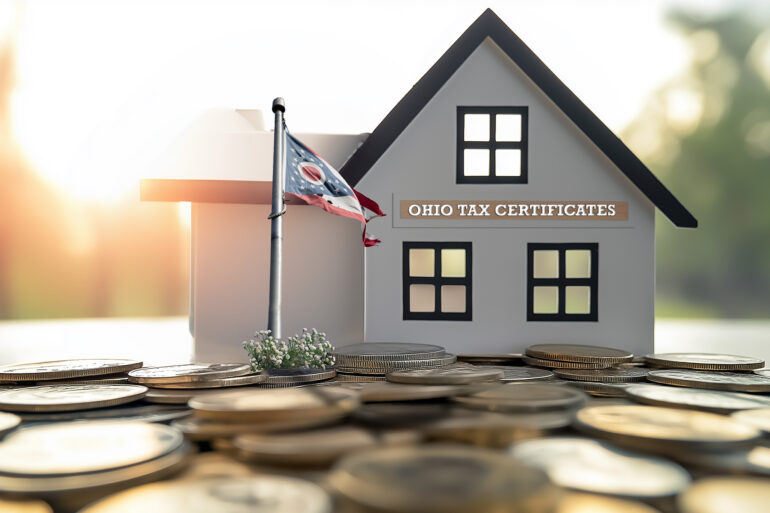How to Purchase Ohio Tax Certificates
Property owners in Ohio are responsible for paying property taxes twice yearly. These tax obligations are calculated based on the appraised value of the property, and the proceeds are used to fund government operations, such as schools, social services, and public works. If the taxes associated with a property are delinquent, the county treasurer will impose a lien.
A property tax lien is a lawful claim against the owner, which allows for seizing assets to recover the debt. Rather than directly initiating collection efforts, many Ohio counties sell tax lien certificates. The buyer of a certificate becomes the superior (first) lien holder against the property. If the property taxes remain unpaid for a one-year period, the certificate holder may begin recovery efforts, typically through foreclosure.
Tax lien investing is a niche often described as a form of indirect real estate investing. Nationally, these investment opportunities are somewhat limited, as Ohio is among roughly 21 states that sell certificates. Let’s examine this market for real estate investors in Ohio.
In this area of Ohio real estate investing, a clear lack of continuity exists between counties.
Understanding the Investment Opportunity
Investors may purchase certificates from tax lien auctions, which are typically held once per year either in-person or online. For example, annual lien sales generally occur in October or November in Franklin County (Columbus), Hamilton County (Cincinnati), and Cuyahoga County (Cleveland).
The buyer of the tax certificate will pay the outstanding taxes in addition to any interest, penalties, and administrative fees. In return, the buyer will eventually receive reimbursement for their purchase when the property owner pays their delinquent taxes and will also collect interest at an agreed-upon rate.
In most Ohio counties, the “winning” bidder of a tax lien auction is the one who is willing to accept the lowest interest rate (return). Consider the following example scenario as explained by the Hamilton County Treasurer:
Delinquent tax amount: $5,000
The winning purchaser agrees to a 6% interest rate.
Annual interest earnings = 5,000 x .06 = $300
Investment Return Calculator
Results:
In Hamilton County, the lien certificates are valid for a maximum of three years; however, the certificate holder will usually begin the foreclosure process after the first year.
Why Are Ohio Counties Selling Tax Certificates?
Property owners who fail to pay their taxes create potential revenue shortfalls for the municipality. By selling tax certificates, the government receives the outstanding funds quickly instead of waiting for a potentially long-term legal process to conclude.
Difference Between Tax Liens and Mortgage Liens
A property tax lien is distinct from a mortgage lien. A mortgage lien is initiated by a lender, such as a bank or other institution that provides home loans. Under Ohio law, tax liens are prioritized over other liens, which generally include judgments imposed by courts or mortgage lenders.
Subsequent Tax Liens
While tax lien certificates in Hamilton County have a term of three years, other counties, such as Franklin County, sell certificates with a six-year term. In either case, the holder of an existing certificate might face an upcoming expiration date if the current property owner still owes taxes. Here, counties will sell new or subsequent tax lien certificates. In Franklin County, existing certificate holders may purchase subsequent tax lien certificates, which automatically have a favorable 18% interest rate.
Many Ohio counties increasingly sell tax lien certificates only in bulk.
The Impact of Rising Property Values and Tax Liens
Recent estimates from the National Tax Lien Association indicate that U.S. homeowners failed to pay approximately $22 billion in property taxes last year.
Counties in Ohio reassess or reappraise property values every few years, which subsequently increases the property tax obligations for homeowners. The spike in taxes can adversely impact many households who are struggling to meet their monthly expenses and often results in more property tax delinquencies. In Cincinnati recently, some property owners experienced “sticker shock” when realizing increases of more than 40%. Conversely, rising property values may benefit tax lien investors.
Procedural Differences Among Ohio Counties
In this area of Ohio real estate investing, a clear lack of continuity exists between counties. This poses challenges for potential investors who must remain abreast of the intricacies involved with each county.
Some Ohio counties no longer sell tax lien certificates to individual, private investors. For example, Portage County currently maintains a contract with Finch Investment Group, LLC (FIG), which is the exclusive buyer of all tax liens.
Tax lien investing in Ohio may be lucrative, as some investors do earn over 30% on their investments in only two or three years.
Potential Risks and Drawbacks of Tax Lien Investing in Ohio
Interest Rate Erosion
Competition is often fierce at tax liens auctions, which may erode the final interest rates for winning bidders. Here, investors may find that their profit potential is minimal.
As with most aspects of tax lien investing, interest rates on tax lien certificates may vary between states or jurisdictions. For example, rates are fixed at 12% in Alabama, 16% in Arizona, and 18% in Florida.
Bulk Sales Requirements
Many Ohio counties increasingly sell tax lien certificates only in bulk; thus, smaller investors are unable to purchase liens on individual properties. For example, the average purchase of tax liens in Cuyahoga County involves hundreds of properties and usually ranges from $10 to $17 million. The same applies in Franklin County, as buyers must purchase a portfolio of lien certificates totaling several million dollars.
Possible Title “Defects” or Encumbrances on the Property
Although a tax lien certificate buyer assumes the superior position among other lienholders, county treasurers sell tax liens without any guarantees that the property is free of other liens or defects that may significantly prolong and complicate the potential foreclosure process. For example, the property owners might have liens from domestic court judgments or unpaid federal taxes. Aside from title-related challenges, foreclosed homes are known for problems, such as having major property damage and “squatter” tenants.
Varying Laws and Requirements
Investors in tax liens must do their “homework” because of jurisdictional differences and changes made by county treasurers, which may frustrate and deter some prospective investors. Further, some of the auction-related information on county websites is inaccurate or outdated.
Should I Invest in Ohio Tax Liens?
Tax lien investing in Ohio may be lucrative, as some investors do earn over 30% on their investments in only two or three years. In some cases, for a rather small investment, a tax lien certificate buyer could ultimately assume ownership of a property through foreclosure and either sell it for a large profit or transition it into a lucrative, long-term rental property.
However, real estate investors are generally encouraged to buy tax liens as a secondary part of a comprehensive, diverse portfolio.
First, more than 90% of tax lien certificate buyers will never ultimately foreclose on the associated property, as most homeowners will work out some repayment arrangements. Second, large private equity firms and hedge funds are beginning to dominate the market, as more counties enter “exclusive buyer” contracts and sell certificates in bulk. Lastly, tax liens are not a good option for those seeking passive investment opportunities because of the varying local requirements, potential unforeseen legal hurdles, and high market volatility.








